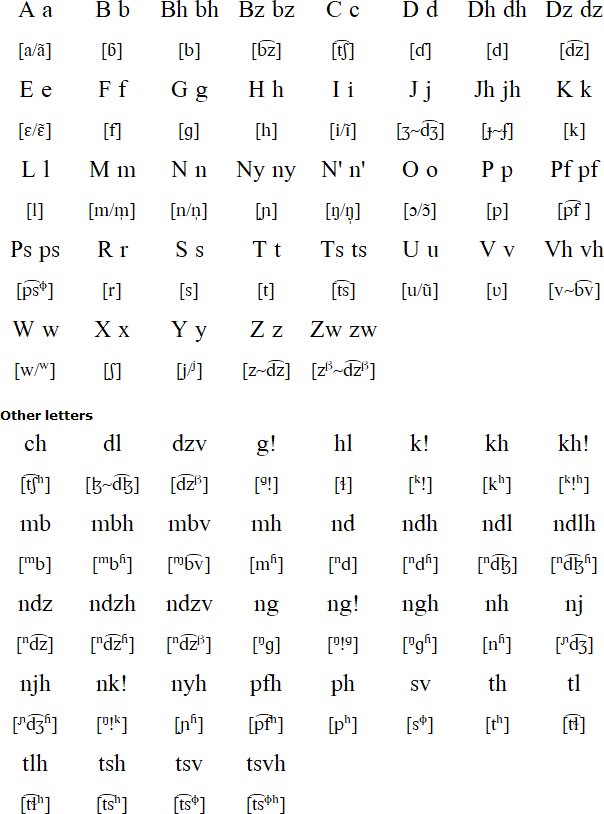Chopi is a Southern Bantu language spoken by about 1.1 million people in Inhambane Province in southern Mozambique. In particular, it is spoken in the Zavala District in the south of Inhambane Province, and also in the city of Inhambane, and in the districts of Inharrime, Maxixe and Jangamo.
Other names for Chopi include Cicopi, Copi, Chope, Shichopi, Shicopi, Tschopi, Tsitxopi and Txopi. It is written with the Latin alphabet.

Download an alphabet chart for Chopi (Excel)
Detail of the Chopi alphabet provided by Wolfram Siegel (PDF)
Sungameto ya tshitishi atshiya ngu gondissa tshishopi vhatu vha matiku o hambana. Mishuvhu yo gondela tshitshopi ya khatile la Vivi, a kuni lokhoko lo wotissa matuse a li lidhimi. Se hiwona ti to khene kulavheka ku ni mugondissa ka tshitishi atshia ku vhamwane vhana gonde.
The idea of this channel is to teach Chopi to people from different countries. The decision to learn Chopi started with Vivi, who had the patience to ask different words in this language. From there, we began to see it was necessary to teach through this channel so that other people can also learn.
Source: 01 - LEARNING CICOPI - APRENDIENDO CICOPI - TEASER
Information about Chopi
https://en.wikipedia.org/wiki/Chopi_language
https://fr.wikipedia.org/wiki/Chopi_(langue)
https://pt.wikipedia.org/wiki/Língua_chope
http://www.language-archives.org/language/cce
https://www.101lasttribes.com/tribes/chopi.html
https://glottolog.org/resource/languoid/id/chop1243
https://www.scribd.com/document/733996869/Linguistica-Bantu
Aka, Aushi, Bafaw-Balong, Bangi, Bangubangu, Basaa, Bemba, Bembe, Bena, Benga, Bhaca, Bila, Bube, Budu, Bujeba, Bukusu, Bulu, Bushong, Central Kilimanjaro, Central Teke, Chichewa, Chokwe, Chopi, Chuwabu, Comorian, Dciriku, Digo, Duala, Eton, Ewondo, Fang, Fuliiru, Fwe, Ganda/Luganda, Giryama, Gogo, Gungu, Gusii, Gwere, Gyele, Haya, Hehe, Herero, Ibinda, Idaxo-Isuxa-Tiriki, Ikizu, Ikoma, Jita, Kabwa, Kako, Kalanga, Kamba, Kanyok, Kiga, Kikuyu, Kimbundu, Kinyarwanda, Kirundi, Kisi, Kobo, Kogo, Komo, Kongo, Konjo, Koti, Kuhane, Kukuya, Kunda, Kuria, Kwambi, Kwangali, Kwasio, Lambya, Lega, Lengola, Lingala, Loma, Lomwe, Lozi, Luba-Katanga, Luchazi, Lunda, Luvale, Luyana, Makaa, Makonde, Makhuwa, Mandekan, Maore, Masaaba, Mbama, Mbere, Mbosi, Mbugu, Mbukushu, Mbunda, Mbuun, Mende, Mongo, Mpiemo, Mushungulu, Mwani, Myene, Nambya, Nande, Ngoni, Ngwii, Njebi, Nkore, North Teke, Northern Ndebele (South Africa), Northern Ndebele (Zimbabwe), Northern Sotho, Nyamwezi, Nyakyusa, Nyemba, Nyole, Nyoro, Nyungwe, Nzadi, Oroko, OshiWambo, Pagibete, Pare, Punu, Rangi, Ronga, Safwa, Seki, Sena, Sengele, Shambala, Shona, Soga, Songe, Southern Ndebele, Southern Sotho, Suba, Sukuma, Swahili, Swati, Taita, Talinga, Tanga, Tembo, Tetela, Tonga, Tongwe, Tooro, Tshiluba, Tsonga, Tswa, Tswana, Tumbuka, Turu, Umbundu, Venda, Vili, Vwanji, Wanzi, West Teke, Xhosa, Yakam, Yansi, Yao, Yasa, Yeyi, Zigula, Zinza, Zulu
Languages written with the Latin alphabet
Page created: 21.10.25. Last modified: 21.10.25
[top]
You can support this site by Buying Me A Coffee, and if you like what you see on this page, you can use the buttons below to share it with people you know.

If you like this site and find it useful, you can support it by making a donation via PayPal or Patreon, or by contributing in other ways. Omniglot is how I make my living.
Note: all links on this site to Amazon.com, Amazon.co.uk
and Amazon.fr
are affiliate links. This means I earn a commission if you click on any of them and buy something. So by clicking on these links you can help to support this site.
[top]